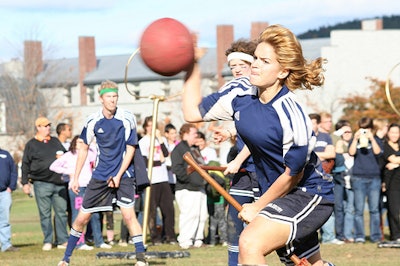As "Harry Potter and the Deathly Hallows" swoops into theaters on Friday, nearly 750 muggles (non-wizards, for you non-"Potter" fans) mostly from North America are recovering from a sporting event inspired by the mega-hit film series. The schools are playing organized Quidditch, too. Not bad for a fictional sport. At DeWitt Clinton Park, Middlebury College won its fourth consecutive World Cup, beating out the Tufts "Tufflepuffs" in the championship match 100-50. "I think we'd all like to win this tournament, but the point of this game is really just to have fun," Middlebury seeker Ryan Scura told Stony Brook, N.Y., newspaper The Statesmen as he warmed up. "It's really hard to not see the goofy appeal in all of this, but that's what we love about it." In the "Harry Potter" movies, Quidditch is a polo-style game played on flying broomsticks by students of the Hogwarts School of Witchcraft and Wizardry; in the real world, it involves elements of rugby, soccer, basketball, dodgeball and tag played on a field comparable in size to a soccer pitch. Familiarity with Quidditch, as portrayed in the movies or books, is beneficial to understanding the rules of the game, which involves two teams consisting of players assigned specific duties ("chasers," "beaters," "keepers" and "seekers" - the latter being Harry Potter's position).
 quidditch2.jpg
quidditch2.jpg
"It's like drunken shenanigans, but we're not actually drunk," Michael D'Angelo, president of the Buffalo Quidditch Club - a World Cup IV participating team - told the Buffalo News. "Muggle Quidditch," or "Ground Quidditch," began in 2005 as an intramural activity at Middlebury College, with rules adapted from J.K. Rowling's "Harry Potter" novels, and in 2007 the league founded the Intercollegiate Quidditch Association (renamed the International Quidditch Association earlier this year). For the past three years, the IQA has helped students from more than 400 colleges and 300 high schools form teams, and over half of them are active already, according to IQA's website. The vast majority are based in the United States, where Quidditch is represented in 45 states. U.S. teams are split into five regions: Northeast, Southeast, Midwest, Southwest, and West. Other countries with teams or leagues that play by IQA rules include Canada, Mexico, Brazil, Colombia, Peru, France, Germany, the United Kingdom, India, South Korea, Australia and New Zealand.  quidditch.jpg
quidditch.jpg
One of those organizations recognized by IQA is the Iowa State University Quidditch Club, which gained official on-campus status earlier this month. Founded by Haley Dillon, a junior majoring in materials engineering, and her freshman brother Mark, the club will play its first scrimmage on Nov. 28. The Dillons hope the club will compete in regular weekend matches against other college teams next year. Meanwhile, the club continues to gain new members via word of mouth and a Facebook page - which is proving to be easier than gaining official club status from the university. "This took a little while and a couple of refusals before finally I found a professor willing to support such a nerdy club," Haley Dillon recently told IowaStateDaily.com. IQA founder and commissioner Alex Benape welcomes the sport's expansion, but he has reservations about whether Quidditch should ever attain NCAA status. "I think Quidditch sprang out of a desire to create a game that's more just about having fun," he told National Public Radio in early November. "NCAA sports at colleges are super-intense. I have a lot of respect for varsity athletes at colleges, because they dedicate their whole lives to that, and I don't want Quidditch to be something that becomes that serious."




































